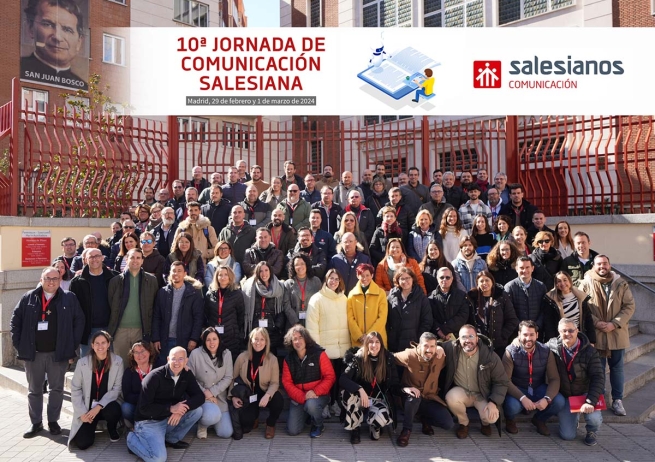After initial greetings from the Delegates for Social Communication of both Spanish Salesian Provinces – Fr Javier Valiente, Delegate for St James the Greater Province (SSM), also National Delegate, and Fr Carlos Martín, Delegate of Mary Help of Christians Province (SMX) – the work was opened by a talk on "From collective intelligence to artificial intelligence. The Salesian visioninvolving education, communication and young people", by Fr Valente.
"Communication is part of the Salesian DNA" he began. "Today we see Don Bosco as a complete communicator, using every channel, with an innovative vision for the times in which he lived. He was able to create a communication ecosystem in the Oratory, a perfect communication machine. Artificial intelligence is a new form of communication that must be explored to apply it to the learning and evangelisation of our young people."
As the second session of the day, Charo Fernández Aguirre, a teacher linked to the formation of "Escuelas Católicos" and an expert in the use of Information and Communication Technologies in the education and training of teachers, analysed the "guts" of Artificial Intelligence and how the different application models that use this type of intelligence work, giving some clues about the limits and advantages of their application in the field of education.
When asked about how to advance Artificial Intelligence in the field of education, the speaker was clear: "Without haste, but relentlessly, because it is a new way of processing information that changes everything and is unstoppable. It is already a reality today, but progress is happening very quickly" Prof. Fernández explained.
Two successive series of workshops were held on Thursday afternoon, conducted by experts in their respective sectors, in the style of the so-called "TEDx talks", with the aim of providing participants with guidelines on how to use Artificial Intelligence tools for communication, creativity and education. In addition, those present were able to receive interesting ideas from teachers such as Javier Monteagudo, who collaborates with several educational institutions for the training of teachers in areas related to educational change, and Francisco García Donate, a university professor and member of "Digital Communication" at the LLYC Global consulting company.
The comments of the participants after the workshops showed common surprise, almost disbelief regarding the great potential of the tools shown, but at the same time also the sense of responsibility and balance needed to be able to better understand this new technology and work as a group to see how this new way of processing information can be used to improve learning and generate more critical, committed and responsible citizens with their environment.
During the conference, the participants raised several questions, including some about the ethics of content generated by Artificial Intelligence, as well as doubts about the copyright of that content; questions to which the speakers responded by asserting that, being an experimental and rapidly evolving field, the challenges on which the experts are working are precisely legal regulation, as well as the identification of common ethical criteria.
On the morning of Friday, 1 March, Idoia Salazar, an expert and consultant on digital regulation, lawyer for the Council of State and professor of Digital Law, shone an even more specific light on the latter issue.
"The problem is not the tools of Artificial Intelligence, but those who manage them, with their risks of manipulation, such as campaigns of ideological manipulation in politics or other similar issues. In this regard we must be very attentive and vigilant to these situations and implement laws and ethical criteria that defend people's rights" the professor explained.
He also added: “There have been attempts to create a global code of ethics for artificial intelligence, but this has not been possible due to the different sensitivities of cultures around the world. In any case, tools such as ChatGPT and others already establish rules and algorithms in the training of their Artificial Intelligence models that do not allow them to answer questions about how to make a bomb, assemble a weapon, commit suicide/murder... And Artificial Intelligence systems are beginning to incorporate a number of values such as justice, solidarity, cooperation, empathy, gender equality and non-discrimination…. But there is still a long way to go, and in this regard the European Union has already begun to regulate some aspects to prevent risks for its citizens."
Friday's session ended with group work in which the participants shared and discussed what they had heard and experienced, consolidating their knowledge and looking for synergies for the work of cooperation between the different reference people for communication in the Salesian presences in Spain.
Source: Salesianos.info


